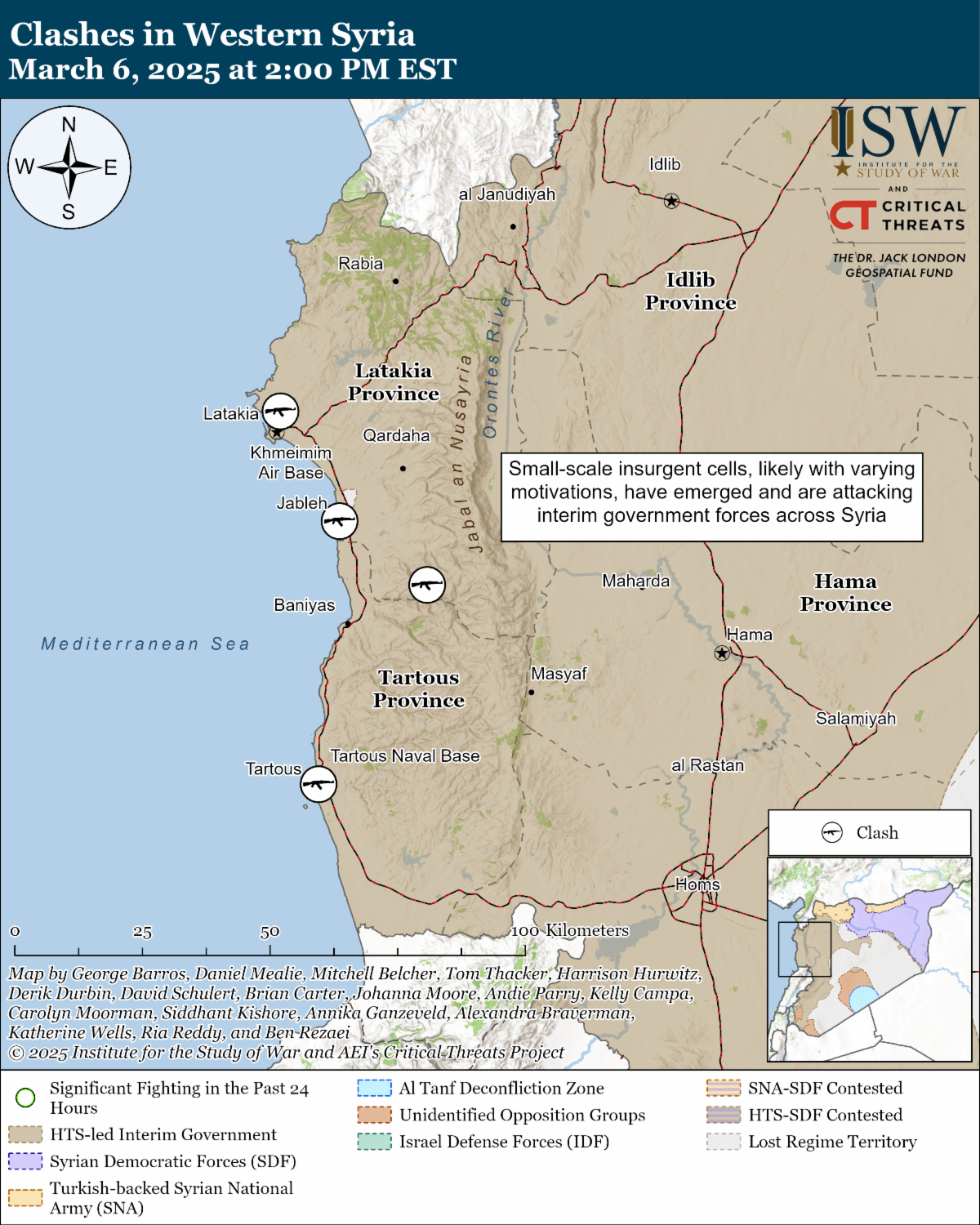Small-scale insurgent cells have started to emerge and attack Syrian interim government forces in certain areas of Syria. Former Assad regime members conducted coordinated attacks on Syrian military checkpoints and patrols in Jableh, Beit Ana, and Daliyah in Latakia Province on March 6. Interim government forces deployed to the area and cordoned off the area, presumably ahead of a clearing effort. Interim government forces suppressed fighters in Beit Ana and Daliyah but continue to engage former Assad regime members in the Latakia countryside at the time of this writing. CTP-ISW will continue to monitor this developing situation. Former Assad regime members have killed at least 13 Syrian soldiers on March 6. Former Assad regime loyalists have announced their intent to restore Assad’s rule in Syria. It is unlikely that all of the individuals who participated in the attacks on interim government forces joined in the fighting to topple the government and restore Assad, however.
Former Assad regime members will very likely form the most effective insurgent cells, given their pre-established networks. Former Assad regime members already have preexisting networks that they can leverage to rapidly organize insurgent cells. These networks are military, intelligence, and political networks and criminal syndicates who were regime supporters and lost significant economic and political influence in the aftermath of Assad’s fall. These networks could enable former Assad regime members to coordinate attacks across wider areas. This is particularly true in former regime stronghold areas in coastal Syria.
These hardcore Assadists will likely exploit a variety of grievances against the Syrian interim government to recruit new members who may or may not be initially motivated by a desire to restore Assad. Insurgent groups often attract supporters who hold a range of social, economic, and political grievances. Interim government forces have conducted near-constant raids in former regime strongholds targeting former Assad regime members since coming to power in December 2024. These raids, while resulting in the arrest of many mid- to high-level Assad regime officials, have also fueled reports of revenge-based attacks and harassment, particularly against the Alawite community. Members of the Alawite community have expressed their belief that Alawites are being economically disenfranchised by Sunnis as part of a broader effort to marginalize the Alawite community. This is not true; all of Syria is economically devastated, but Alawites believe they are ”uniquely” experiencing economic issues nonetheless. Former Assad regime members have reportedly used Alawite fears of attacks on the community to mobilize young men to take up arms. Interim government forces have also launched a campaign to interdict drug smuggling in western Syria, cutting off a once-steady revenue stream for some criminal syndicates and their beneficiaries. Insurgent groups can leverage these grievances against the interim government to increase their supporter base, and have already begun to do so.
Key Takeaways:
- Emerging Syrian Insurgency: Small-scale insurgent cells have started to emerge and attack Syrian interim government forces in certain areas of Syria. Former Assad regime members will very likely form the most effective insurgent cells, given their pre-established networks. These hardcore Assadists will likely exploit a variety of grievances against the Syrian interim government to recruit new members who may or may not be initially motivated by a desire to restore Assad.
- Iranian Sanctions Evasion: The United States is considering a plan in which it could ask allies to stop and inspect Iranian oil tankers, according to unspecified sources speaking to Reuters on March 6. Iran could respond to such a plan by attacking or seizing commercial vessels or tankers in the Persian Gulf.
- Russia in Syria: Syria has established some degree of economic cooperation with Russia amid negotiations between the Syrian interim government and Russia over Russian basing rights in Syria. Russian oil exports to Syria come as Syrian officials have expressed interest in developing economic ties with Russia in recent weeks.
- US-Israeli Exercises: The US and Israeli air forces conducted a joint exercise on March 4 to strengthen interoperability and prepare for "a range of scenarios.”
- Druze in Syria: Prominent Druze militias and the Syrian government agreed to establish Suwaydawi-led security forces under interim Syrian government control in Suwayda Province. The Druze militias and interim government agreed that local leaders and residents from Suwayda would comprise the province’s security units, although it is unclear if Suwaydawis will have a majority presence in the units or if the units will only be comprised of Suwaydawis.
| 



